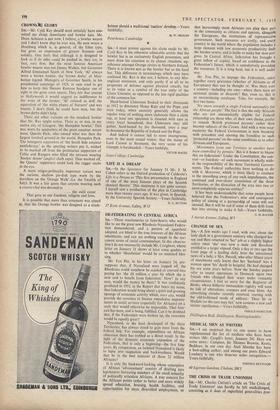DE-FEDERATING IN CENTRAL AFRICA
SIR,—Those reactionaries or faint-hearts who would like to see the great new Rhodesia-Nyasaland Federa- tion dismembered, and a pattern of apartheid adopted, are blind to the true interests of the African inhabitants, and can see nothing except in the nar- rowest terms of racial communalism. In this observa- tion I do not necessarily include Mr. Creighton, whose letter on January 31 shows at least some qualms as to whether 'dissolution' would be an unmixed bles- sing.
Mr. Fox Pitt, in his letter on January 24, pre- supposes that, if Nyasaland were lopped off, the Rhodesias could somehow be cajoled or coerced into paying her `the £4 million a year by which she is now said to benefit from federation.' How? In any case, would the money be there? It was confidently predicted in 1951, in the Report that bears my name, that federation would bring about a great and growing upsurge of economic activity which, inter alia, would provide the revenues to finance cumulative improve- ments in social services (especially for Africans) on a scale that would otherwise be impossible. That fore- cast has been, and is being, fulfilled. Can it be doubted that, if the Federation were broken up, the recession would be equally great?
Nyasaland, as the feast developed of the three Territories, has always stood to gain most from the federal link. For example, expenditure on African education there has trebled as a direct result. In the light of the dynamic economic expansion of the Federation, that is only a beginning—the first four years. By comparison, an isolated Nyasaland is likely to lapse into stagnation and backwardness. Would that be in the best interests of those 2-1- million Africans?
It is only the backward-looking whose conception of African `advancement' consists of drafting into legislatures increasing numbers of the small minority of politically articulate Africans. A true concern for the Africans points rather to better and more widely spread education, housing, health facilities, and opportunities for more diversified employment, so
that increasingly more Africans can play their part in the community as citizens and operate, alongside the Europeans, the institutions of representative government. Such measures are costly; and every country in the world where the population includes a large element with low economic productivity finds the burden severe, and is liable to make but slow pro- gress. In Central Africa, federation has brought a great inflow of capital, based on confidence in the Federation's future, which is cumulatively providing the resources. It is a long haul, but it is well under way.
Mr. Fox Pitt, to impugn the Federation, rakes together every grievance (whether of Africans or of Europeans) that can be thought of. Was there ever a country—including our own—where there were no sectional strains or discords? But, even so, this is an unconvincing catalogue. Take, for example, the first two items.
'No move towards a single Federal nationality for the African people.' The fact is that the only Africans who are not automatically eligible for Federal citizenship are those who, of their own choice, prefer to remain 'British protected persons' rather than become subjects of the Crown. And with a wise mag- nanimity the Federal Government is now breaking with precedent and opening the franchise to such `protected persons' on the same conditions as to other Africans and Europeans.
`Movements from one Territory to another have been controlled by permits.' But is it honest to blame this on federation? Under the Constitution, the con- trol—or freedom—of such movement is wholly with- in the responsibility of the three Territorial Govern- ments. The Federal authorities have nothing to do with it. Moreover, which is more likely to conduce to the smoothing away of any such impediments, the continual and ever-closer association of the three Territories, or the dissection of the area into two or more completely separate entities?
It has been understandable that some people have believed that the Federation's wise and courageous policy of aiming at a partnership of races will not succeed. But it will be sad if some of them drift from that into striving to make it fail.—Yours faithfully,


































 Previous page
Previous page